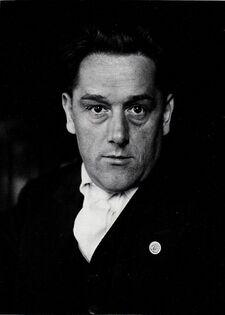Lars Hencke
Lars Hencke | |
|---|---|
 Hencke in 1926 | |
| Chancellor of the Vierz Empire | |
| In office 11 March 1927 – 15 June 1927 | |
| Monarch | Alexander II Victor II |
| Preceded by | Alois Behrends |
| Succeeded by | Hermann Eschau (as acting Chancellor) |
| Chairman of the Vierz Socialist Party | |
| In office 3 October 1924 – 16 June 1927 | |
| Preceded by | Julius Seelmann |
| Succeeded by | Nicolas Krukenberg (as acting Chairman) |
| Member of the Imperial Assembly for Geismar | |
| In office 11 January 1927 – 15 June 1927 | |
| Chairman of the League of Vierz Socialists | |
| In office 13 July 1918 – 22 April 1922 Serving with Ernst Steinbach | |
| Preceded by | None (office created) |
| Succeeded by | None (party disbanded) |
| Personal details | |
| Born | Lars Heinrich Hencke 2 May 1882 Wittenthal, Geismar, Vierz Empire |
| Died | 21 February 1931 (aged 48) Rheisthul Prison, Rastede, Vierz Empire |
| Cause of death | Pancreatic cancer |
| Political party | League of Vierz Socialists (1918–1922) Vierz Socialist Party (1922–1927) |
| Education | Imperial University of Friedrichstadt |
Lars Heinrich Hencke (2 May 1882 – 21 February 1931) was a Vierz Flecquist, journalist, trade unionist, anti-war activist, and politician who served as the Chancellor of the Vierz Empire from March to June 1927.
Hencke was born to a working class family in Wittenthal in 1882. His father, a coal miner, was arrested for striking in 1889, and later died in custody. Hencke became involved in workers' rights movement, writing for Workers' Tribune newspaper in the 1890's. He won a scholarship to the Imperial University of Friedrichstadt in 1901, where he studied humanities. He became involved in the university's Flecques Club, where he was further entranced by the socialist movement. He was an outspoken critic of the Frontier War and conscription, which resulted in his arrest by the authorities. After being freed, he co-founded the League of Vierz Socialists (BVS) with Ernst Steinbach in 1918.
As a result of its electoral failures, the BVS merged with the Vierz Workers' Party in 1922 to form the Vierz Socialist Party (VSP). Hencke was made the chief editor of the party newspaper, and eventually became VSP chairman in 1924. Under his leadership, the VSP secured 33.4% of the vote in the January 1927 election, and 35.5% in the March election. Hencke drew support from working class voters, promising a socialist platform of nationalization of the banks and redistribution of wealth during the economic downturn of the Dark Months. On 11 March 1927, he was named chancellor by emperor Alexander II.
Hencke struggled to implement policies due to the disloyalty of the military and the police, who favoured right-wing politics. Political violence and crime skyrocketed and the police often refused to enforce Hencke's directives. Alexander II abdicated amid the chaos on 11 June 1927, and his successor Victor II entrusted field marshal Hermann Eschau to restore order. On 15 June, Hencke was overthrown in a military coup. He was detained and later sentenced to 50 years in prison on charges of treason after he was falsely accused of attempting to solicit support from the Luepolan government. Demonstrations against his overthrow were put down with force. Hencke died on 21 February 1931 at the age of 48 due to complications of pancreatic cancer, made worse by poor conditions in the prison in which he was held.
During the remainder of the imperial era most information about Hencke was suppressed and censored by the government. When the Vierz Empire collapsed in 1990, numerous archives and classified information were made public, including those regarding Hencke. He was officially exonerated by the Salzer Commission in 2002 under the chancellery of Paul Bachmeier. Today he is widely regarded by Vierz leftists as an honourable fighter for social justice who was illegally deposed by an oppressive military dictatorship. Many streets, monuments, schools, and public spaces are named after him. Lars Hencke Adtrus Airport, which now serves the Vierz Air Force, was renamed in his honour in 1993. His birthday, 2 May, is designated as a holiday in eleven Vierz states.